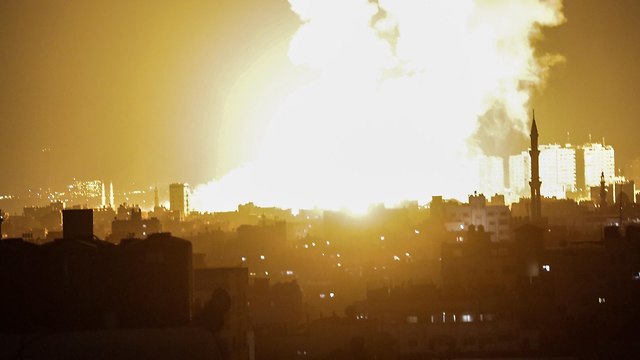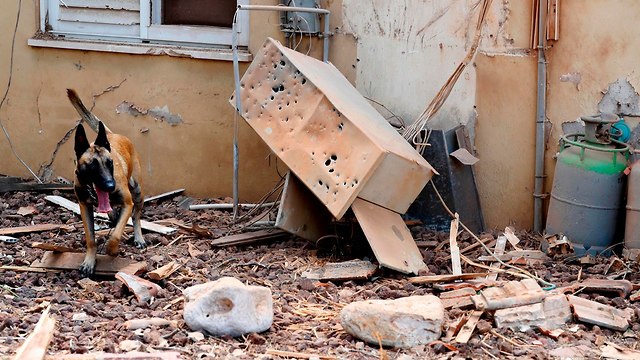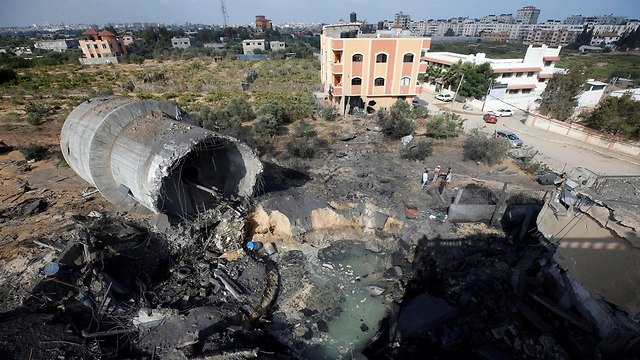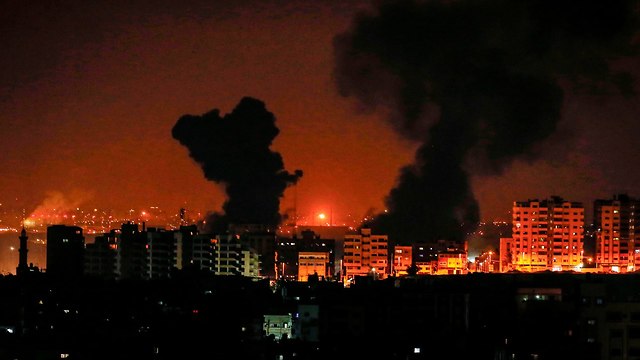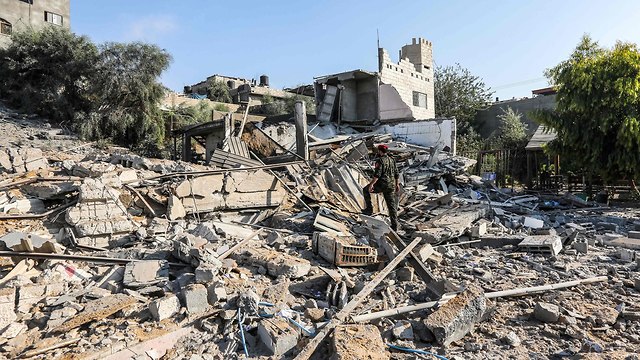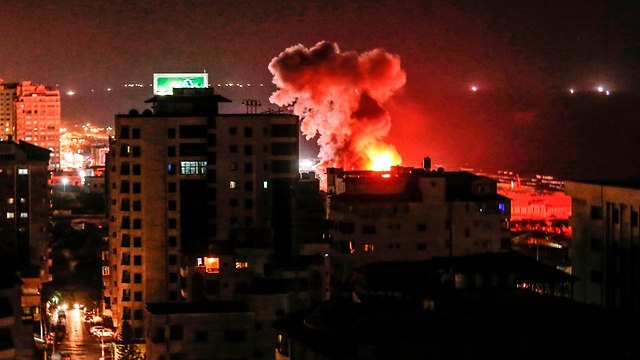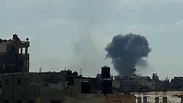

Hamas takes advantage of Israeli wariness of military campaign
Analysis: While the IDF's response to terrorism is bearable, and the Israeli leadership appears to be waiting with bated breath for a ceasefire, Hamas realizes it has all the cards and can get what it wants without concessions. But if even the more serious airstrikes don't help deter Hamas, Israel will be forced into a defensive war and Gaza too will burn.
The reason for this: The State of Israel has managed to convince Hamas that it would do almost anything to avoid sending the IDF into the Gaza Strip for another large-scale military campaign. Government and Cabinet conduct in recent months, IDF actions on the ground, the negotiations with the Egyptians by the Shin Bet director and through the Israeli media—have all made it clear to the Hamas leaders, beyond any doubt, that Israel is willing to take a lot, so long as it doesn't have to launch a wide scale operation.
This desire—justified in and of itself—has in practice become the main objective of Israeli strategy and tactics recently. The government in Jerusalem and the heads of the defense establishment at the Kirya base in Tel Aviv may be constantly declaring that their objective is to reach a stable, long-term calm that provides security and the sense of security to the residents of the western Negev—and they mean what they're saying—but what's happening on the ground makes it absolutely clear to Hamas that the immediate Israeli objective is to prevent another Operation Protective Edge or an even bigger and longer campaign in the strip.
Hamas and the other Palestinian factions see proof of that in the restraint shown by the Cabinet and the IDF in the face of the "incendiary terrorism" and in the responses—limited in scope, time and damage—of the IDF to sniper and rocket fire from the strip, including to incidents in which an IDF soldier was killed and civilians and soldiers were wounded. The IDF doesn't hesitate to shoot at Gazans trying to infiltrate Israel, but shows restraint and great caution when responding to other actions—from burning fields to rockets and mortar shells, whether Hamas is responsible for them or the "errant" groups are behind them.
It's important to note that the aerial blows and tank fire the IDF has been hitting Gaza with in recent months in response to fire at Israel are aimed solely at "assets" of the terror organizations—Hamas's military wing and at times also the Palestinian Islamic Jihad's military wing. The attacks on the military infrastructure both above and below ground cause great damage to the "resistance" organizations—as the Palestinians call them—and at times fatalities as well. It undoubtedly hurts them. But the heads of Hamas and Islamic Jihad's military wings see this as a bearable and legitimate price to the military and psychological achievements.
They see on TV how Gaza border residents are running for shelter at the sound of the Code Red rocket alert sirens every few nights and days, and how the western Negev residents are unable to have a normal daily routine; on the radio they hear the complaints of Israeli residents about how the government is not doing anything; and with their very own eyes they see the smoke billowing from the fields and nature reserves being burned in Israel, hundreds of meters from the border fence. After all, the job of a military wing of a "resistance" organization is to fight and cause damage to the enemy (meaning us) and suffer blows back. It's normal.
Other than the pleasure and excitement at the damage and suffering they cause, Hamas leaders' take from this ongoing state of affairs is that eventually the Israeli government will give in to the pressure and have to meet all of its demands, without it having to make any concessions.
Hamas also realizes from the statements in the media by the prime minister, defense minister, Cabinet ministers and the IDF chief that it is not facing any immediate threat of a large military campaign in the strip, and so it allows itself to let the Palestinian youths continue sparking several fires every day in Israeli border communities using kites and helium balloons. What's graver is that it continues with the deterrence policy of "(Israeli) fire is met with (Hamas and Islamic Jihad) fire."
All of the IDF's recent attempts to make it clear to Hamas—using painful aerial responses—that this equation does not pay off (it mostly harms Hamas's military wing's ability to deal with the IDF in the next big campaign, and to the Hamas regime in general) did not change Hamas's behavior. On the contrary, Hamas takes it and keeps going. And if the Israeli retaliation is particularly painful, it always has the Egyptian intelligence head and UN envoy Mladenov to mediate a ceasefire before the damage becomes unbearable.
And that's not all. As a result of this conduct, Hamas has reached the conclusion that in the negotiations over a long-term ceasefire agreement that it is conducting with the Egyptians and the UN envoy, it has all of the best cards—at least when it comes to Israel.
The organization's leadership, which recently convened in Gaza, left for Cairo on Wednesday to tell the Egyptians it will accept their proposal in principle. At the same time, the heads of Hamas are behaving and talking as if they're doing Israel a kindness by agreeing to give it a truce. This is exactly why they're unwilling to make any significant concessions.
Despite the clear distress of both Hamas and the Gaza residents, and despite the fact the organizations has lately been greatly weakened militarily, Hamas is so kind as to accept humanitarian aid and help in the rehabilitation of the strip, but is unwilling to agree to a compromise that would be acceptable to Israel on the return of the Israeli citizens and the remains of soldiers, or on stopping its military buildup. It appears Hamas also believes Israel will pressure Abbas to release the money he stopped transferring to the strip.
In return, the heads of Hamas are offering a five-year calm that would ease the terrible suffering of the Gaza residents and the organization itself. Just as important, it would allow Hamas's military wing to regain strength, make preparations underground, and prepare naval and aerial surprises for Israel for the next campaign. All of this while the Cabinet—mostly Prime Minister Netanyahu—and the IDF's top brass are giving out the clear impression in the media that they have been waiting with bated breath in recent days for Hamas to finally agree to calm—of course, on its own terms.
It's possible the IDF's overnight and morning attacks, which have been more extensive and more serious, will cause Hamas to reconsider and change its assumptions. The price these overnight aerial bombardments have exacted is graver than ever before, and more importantly—not just Hamas military attacks were hit, but also economic targets—such as concrete factories—which set back the efforts to rehabilitate the strip. Maybe Hamas will understand after last night what the IDF has been trying to hint to it all this time—that it can cause irreversible damage to its regime in the strip even without sending Israeli tanks and APCs into the alleyways of Gaza.
For example, Hamas might see burning buildings after incendiary balloons were flown out of them. The residents of those buildings will be forewarned to leave, but their property will burn just like the property of Israelis on the Gaza border. Targeted killings of those responsible for the arson terrorism and rocket launching are also an option for Israel. And at the end of the day, if all of this doesn't help, the Cabinet will send the IDF to a defensive war in the strip.
On this matter, we must beware of the catch. The defense minister's combative rhetoric could give the impression that in the next big round of fighting in Gaza, the IDF will go into the strip and, along with the Shin Bet, stay there for many months until it brings down the Hamas regime. It's important to know this would not necessarily be the case.
Israel can also defeat Hamas by using tactics, fighting methods and accurate and effective weapons that will achieve results fast. If necessary, we could repeat these measures until the Hamas leadership understands Israel and the IDF's strategic paradigm has changed, and that a ceasefire requires concessions and compromises from them as well. Maybe then Cairo and Ramallah will also realize the Israeli Cabinet is not a rubber stamp for the Egyptian intelligence head and the UN envoy.














